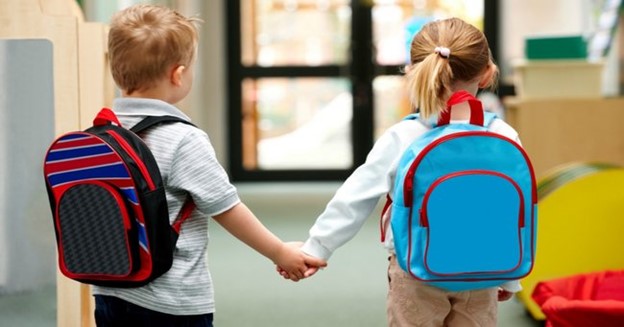Dear parents,
We are happy to welcome you and your children back at Verita! I am Ana-Maria Abatacesei and I am excited to announce that starting this school year I will be joining the Student Support Team of Verita as the EYFS & Lower Primary counselor. I hope this lovely summer you had the opportunity to spend more quality time with your children and to engage in fun activities with them.
First day worries often have to do with your child needing to feel secure and comfortable in school. With everything being new to them, it can become a little overwhelming. It is not uncommon for EYFS and Lower Primary students to feel some amount of separation anxiety. Young children are still strongly attached emotionally to their parents, potentially making the transition to fully-day school dramatic. It can be challenging for every parent to see their child crying and begging for them not to leave. As a parent, it is helpful for you to empathize with your child’s feelings while also displaying confidence in your child’s ability to attend school. To help you navigate these next few days filled with mixed, but strong emotions, both for you and your children, here are a few tips on how to better prepare for this.
When talking to your child about starting school, please keep in mind that the primary way you can comfort them is by providing space for them to express their fears and insecurities, not by offering logical counterarguments. The point would be for them to be able to state anything that they are nervous over and receiving nothing but an understanding, comforting and supporting attitude, no matter how “ridiculous” their fear is. Regardless of the subject, remember that when we validate their feelings, that does not mean we also validate the fear itself – they are two separate things. We want to tell them things such as:
- This does sound scary; I can understand why you would feel this way.
- I know, most children are also scared of … (normalizing the fear).
- Tell me more about this (breaking down a “big” fear into “little” ones might make it easier for the child to handle; for example, “I am scared of school” could turn into “I am scared I’ll get lost in the building” + “I am scared I won’t make friends”)
Join us at the Open House Day on Wednesday, 31st August with your child. This is a great opportunity for your child to get familiarized with the campus, the new teachers, the new colleagues. Offer as much predictability as possible, even regarding what they will wear on the first day, what they will have for breakfast, tell them who will be dropping them off. The child’s anxiety will be greatly reduced if they know what is happening.
Read a short story about the first day of school – this is a great way to get a shy child to express feelings about the topic. Ask them open-ended questions as you are reading, such as “What do you think of this?” “What would you do differently?”. “Bufnitel si prima zi de scoala” is a recommended book for young Romanian-speaking children; for slightly older, English-speaking children, “Jake’s first day” can be found online as a PDF.
Prepare in advance something to give to your child, a “part” of you which they can take with them, it could be anything from a doll, a blanket, a beloved book, a sippy cup filled with their favorite drink, you can draw a heart on their arm or give them a piece of your jewellery or even spray them with a bit of your perfume. Comfort objects may seem like small things, but they can provide a real sense of security to your child in an new or unfamiliar environment.
When dropping them off at school, do your best to show enthusiasm, even if you are nervous for your child. Oftentimes, the child will mirror your emotion and it is important to give off the message that going to school is fun and exciting.
Create a goodbye ritual. Having a goodbye routine provides comfort and familiarity. This could be anything you and your child decide on, such as a special hug or a secret handshake. Once you said goodbye, it is the best to take off so that your child does not become preoccupied by your presence. A long farewell scene might only reinforce a child’s sense that school is a bad place.
Be confident, kind but firm about the separation. Depending on your child’s age, they might struggle with leaving your side and they might say things along the lines of “I don’t want to go to school” – it really is not about school, it is about them not wanting to separate from you, so offer them hugs and kisses and assure them that you will wait for them right there in a few hours to pick them up.
Be very cautious about prolonging the separation process, as it will only get more difficult. Ask a staff member to help you out if needed. While logical arguments and explanations are reasonable for older children and adults, little ones do not have the cognitive abilities to understand your reasoning, especially in a stressful situation where they are separated from you.
If your child is having a particularly difficult time separating, as harsh as it sounds, as soon as a member of staff has come over to bring the child into school, just leave. Staying will not make it easier and neither will be bargaining with them.
If you are having a particularly difficult time with the separation process, please let me know so I can offer you all the support you may need during this time.
Kind regards,
Ana-Maria Abatacesei





Leave A Comment